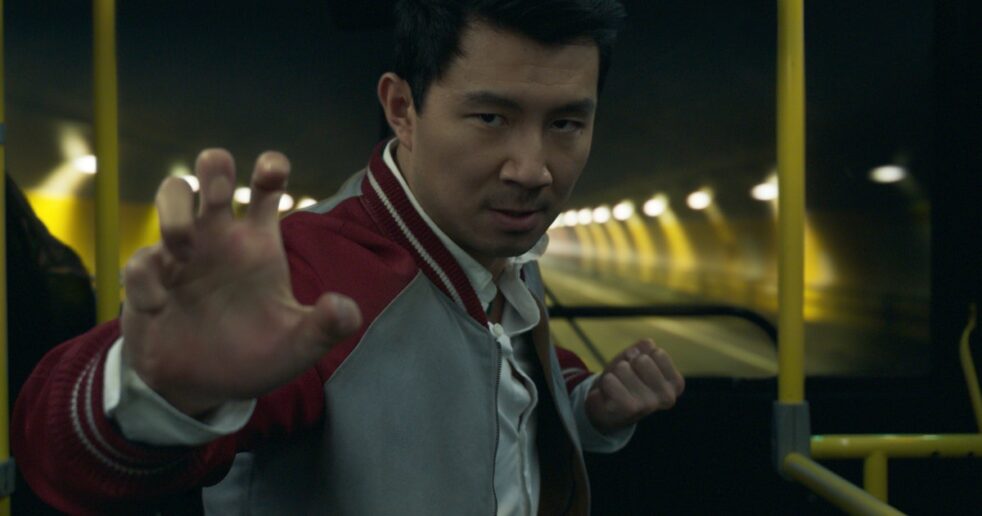Our Take: 3.5 Stars
“Shang-Chi and the Legend of the Ten Rings,” the latest installment in the Marvel Cinematic Universe, offers a look into what’s to come in Phase IV while introducing a new Asian superhero to the MCU.
It introduces the title character (Simu Liu, “Akira Project”), as an unimpressive Californian bachelor named Sean who works as a valet driver, frequents late-night karaoke bars with his best friend Katy (Awkwafina, “Ocean’s Eight”) and relies on Katy’s mother for meals. But Sean’s childish lifestyle is shattered when he is ambushed on a bus by agents of the Ten Rings, an underground terrorist empire built by his father (Tony Leung Chiu-wai, “Red Cliff”) over thousands of years, with the help of ten armlets.
The attack forces Sean to finally reckon with the reality of his past – the death of his mother (Fala Chen, “Heart of Greed”), the brutal training he underwent as a child to become an elite killer, and the failure that caused him to flee his father at 14 and abandon his sister Xialing (Meng’er Zhang). With Katy in tow, Sean (whose real name is Shang-Chi) travels across the world to find Xialing, discover the truth about his mother’s past, and ultimately confront his father and prevent him from unleashing a literal demon on the world.
The film has been received extremely well, with a rating of 92% on Rotten Tomatoes. This is primarily due to its stunning visuals and tasteful depiction of Chinese culture. The action sequences are some of the best Marvel has ever produced as the franchise continues to one-up themselves, taking full advantage of technological advances and big budgets to create increasingly mind-blowing sets.
The emphasis on contrasting martial arts styles is a major theme of the movie. Whereas Shang-Chi’s father relies on his rings for power, his mother draws her strength from nature. Shang-Chi himself struggles to reconcile these two natures, and this element of spirituality comes across through many cleverly choreographed fight scenes, as well as the actual plot and dialogue.
“Shang-Chi” is also Marvel’s first film to feature an Asian protagonist and a predominantly Asian cast. Chen and Leung especially give excellent performances, and Liu successfully portrays someone Shang’s loyalty and self-deprecation. The entire story revolves around an Asian family, and overall, the movie effectively introduces a new world to the MCU. It will be exciting to see the role that this world will play in future.
The main weakness of the film is its canned plot. There is nothing in the story that would surprise or intrigue a casual fan. The connections to other parts of the MCU (Wong, the Mandarin, etc.) are mostly comedic distraction and contribute little to the story, and the movie relies on its massive budget to distract the viewers from an lackluster narrative. The rings are essentially a plot device, the family-centric conflict has a predictable resolution, and everyone pretty much ends up where you would expect them to be.
The character development is also somewhat lacking, as Shang-Chi’s motivations are rather unclear for much of the movie — he abandoned his sister but wants to protect her, and he mourns his mother yet resolves to kill the man she loved. Katy’s character arc is unresolved, and the various decisions made by characters such as Shang’s mother are left unexplained. The story ultimately reaches a conclusion, but it is not a particularly satisfying one.
In the end, “Shang-Chi” is a standard superhero origin story with cool stunts and a unique cultural twist. It is worth seeing in theaters just for the visual effects, and it introduces an exciting new character to the MCU, but it is also somewhat overhyped: the plot is forgettable, and as technology continues to advance, a movie that is so reliant on CGI will not age well. It is comparable to origin movies like Dr. Strange, where the actual events of the movie are secondary to the introduction of central character to the larger narrative of the MCU. After the saga-concluding blockbusters of the past couple years, Marvel is entering a new phase. Shang-Chi serves its purpose as one of the building blocks in this process.
